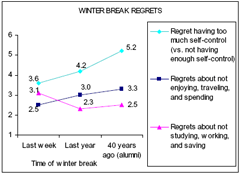
In another experiment, students who'd just come back from their break were polled. The ones who'd partied it up regretted their actions -- while those who studied were virtuously smug. But when asked to recall the spring break from the previous year, suddenly more students regretted their choice not to party. When alumni were asked to recall their spring breaks of 40 years ago, the results were even starker: Those who hadn't been doing beer shots out of a barber's chair were striken with remorse.
Why the reversal? Why do we opt for virtue in the short term, but prefer vice in the long? The reason, the researchers suggest, is in the mechanics of guilt: It's intense and painful emotion in the here-and-how, but fades over time. As they write:
Whereas guilt is an acute, hot emotion, missing out is a colder, contemplative feeling. Therefore, indulgence guilt is expected to predominate in the temporal proximity of the relevant self-control choice, but subsequently diminish over time.Now there's a conclusion that will deeply freak out social conservatives.
The study was done in America in 2006; I wonder whether a similar study done in a culture (say, Japan) with a stronger sense of duty would yield different results.